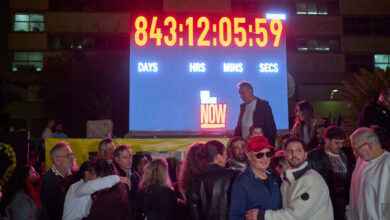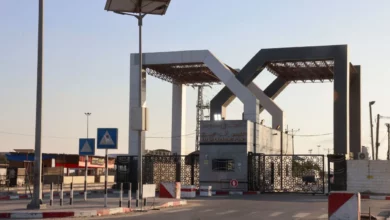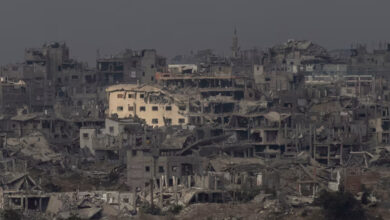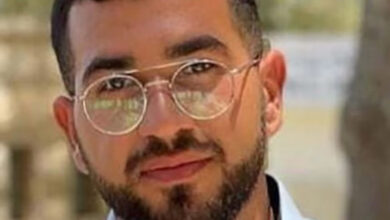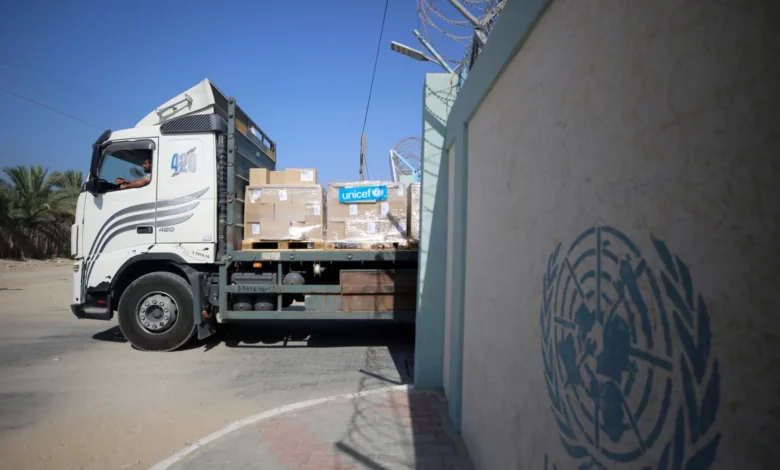
More United Nations aid workers have been killed in Gaza than in any other single conflict in the organization’s 78-year history, the UN said Monday, a stark reminder that humanitarian staff from global agencies have not been spared from Israel’s relentless bombardment of the besieged strip.
A total of 102 aid workers with the United Nations Relief and Works Agency for Palestinian Refugees (UNRWA) were killed and 27 others wounded in Gaza since Israel’s war with Hamas began more than a month ago, the agency said.
“In the last 24 hours, one UNRWA staff member was killed with her family in the north of the Gaza Strip due to strikes,” the agency said in a statement. “This is the highest number of United Nations aid workers killed in a conflict in the history of the United Nations.”
UN offices around the world lowered their flags to half-mast and UN staff held a moment of silence Monday to mourn and honor their colleagues killed in Gaza.
“They will never be forgotten,” said UN Secretary-General Antonio Guterres, who led the minute of silence from UN headquarters in New York.
UNRWA said those killed were among 13,000 of its staff working in Gaza and many had died alongside their families during Israel’s unrelenting bombardment and blockade of the Palestinian territory following the October 7 attack by Hamas militants.
“They were teachers, school principals, health workers, including a gynecologist, engineers, support staff and a psychologist,” the statement said.
The UN aid workers are among at least 11,180 people killed in Israeli airstrikes, including 4,609 children, according to the Palestinian Ministry of Health in Ramallah, which draws its figures from the Hamas-controlled territory.
The latest war exploded after the October 7 terror attacks by Hamas where militants killed at least 1,200 people in Israel and took more than 200 hostages.
Israel says it is fighting to eliminate Hamas – which it says has embedded itself in Gaza’s civilian infrastructure.
UNRWA is the main UN agency operating in Gaza and is sheltering some 780,000 people in more than 150 overcrowded facilities even as basic services have crumbled.
The agency was established a year after the 1948 Arab-Israeli war and provides services such as education, healthcare, and relief and social services.
It followed the creation of the United Nations in 1945, after the Holocaust and other horrors of World War II, with the aim to prevent such atrocities and future world wars from happening again.
Volker Türk, the UN High Commissioner for Human Rights, said on Wednesday that both Hamas and Israel had committed war crimes in the past month.
Home to more than 2 million people crammed into 140 square miles (362 square kilometers), Gaza had long been one of the world’s poorest places, cut off from the outside world for the last 17 years by an Israeli and Egyptian blockade.
Israel’s current siege and bombardment has created a deepening humanitarian crisis with desperate conditions inside Gaza, including the near total collapse of the healthcare system and the widespread destruction of whole neighborhoods.
The agency said its staff are working “round the clock” with scarce supplies to support those displaced in its schools and buildings, facilitating what little aid deliveries make it into Gaza and aiding vulnerable Gazans including pregnant women and babies.
The Israeli blockade on all fuel and most food, water and medicine from entering Gaza has meant UNRWA’s aid operation has been “strangled of resources,” said Thomas White, director of UNRWA Affairs in the Gaza Strip, and the agency will be forced to entirely halt services including desalination plants and waste removal due to a lack of fuel.
White said UNRWA has no fuel to fill its trucks in Gaza and will not be able to receive deliveries of aid through the Rafah crossing on Tuesday.
Earlier this month, UNRWA Commissioner-General Philippe Lazzarini said its staff in Gaza are “sharing the same living conditions as anyone else.”
“They’re struggling on a daily basis to find the bread, to find the water, to protect their children. And despite that, and despite the heavy loss within this organization, they remain committed to do whatever is possible to provide support to the people in Gaza. But it’s a constant daily struggle,” Lazzarini said
Despite protections under international law, aid organizations, NGOs, journalists and medics have also fallen victim to the flighting. The Committee to Protect Journalists said as of Monday, at least 42 media workers have been killed since the start of the war.
More than 60 UNRWA facilities – mostly schools sheltering thousands of civilians – had suffered collateral or direct damage by Israeli strikes, the agency said, and since October 7, 66 people sheltering in its facilities have been killed. On Sunday, one of its premises in Rafah in southern Gaza was hit by an Israeli naval strike and sustained significant damage.
“This recent attack is yet another indication that nowhere in Gaza is safe. Not the north, not the middle areas and not the south. The disregard for the protection of civilian infrastructure including UN facilities, hospitals, schools, shelters and places of worship is testament to the level of horror that civilians in Gaza are living every day,” said Lazzarini.
The Israeli military said Monday that it “carried out a strike based on operational requirements, adjacent to a UN building” on Sunday.
UNRWA said that of the total facilities damaged, 70% were south of Wadi Gaza, in the middle and southern areas including Rafah and Khan Younis. This is the area of Gaza to which the Israeli military has instructed civilians in the north of Gaza and Gaza City to move.
CNN’s Tim Lister, Niamh Kennedy, Tamar Michaelis and Kareem El Damanhoury contributed reporting.

